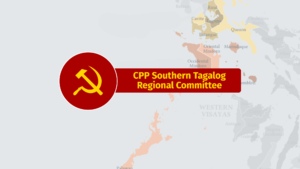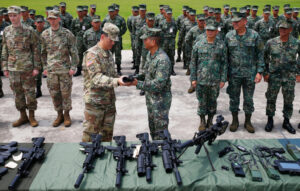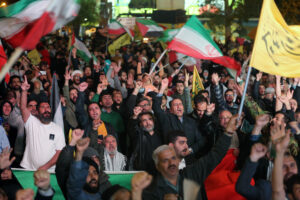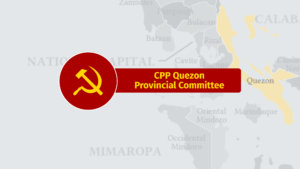Why the NTF-Elcac wants “localized peace talks” and why it must be opposed
Of course the NTF-Elcac will recommend “localized peace talks” because a large part of their lifeline (the so-called “barangay development program”) depend on it. This comes as no surprise.
Sharing the same militarist mindset of the officials of the Duterte regime, the NTF-Elcac officials under Marcos are set to push the same failed counterinsurgency policies that has been unable to stop the steady growth of the New People’s Army and expansion of its areas of operation.
The NTF-Elcac’s “localized peace talks” are nothing but a smokescreen for psywar, pacification and suppression operations conducted by the AFP, together with its full-scale war of large-scale combat operations, artillery shelling and aerial bombings.
Military officers, especially at the division and battalion levels, are very supportive of “localized peace talks” because it opens wide open the opportunity to make money from kickbacks and commissions.
To justify their push for “localized peace talks,” National Security Adviser Clarita Carlos, who has made herself known as an academic, dishonestly declared: “based sa assessment namin within the more than 50 years na negotiation natin, wala po tayong nakuhang maganda doon sa national peace talks.”
I’m sure Prof. Carlos knows that peace talks started only in November 1986, which makes the NDFP-GRP peace negotiations not more than 36 years. She also should know that most of the time, the negotiations have been suspended, and that the overall time spent in direct face-to-face talks has not lasted a few months overall, as the past regime’s could not keep up the pretensions of talking peace.
Also, as an academic, she should know the significance of the agreements forged and signed over the past years, including the Comprehensive Agreement on Respect for Human Rights and International Humanitarian Law (CARHRIHL). It seem she did not at all talked with the GRP’s previous negotiating panel? Because she would have known how they were able to make substantial headway in 2017 with their NDFP counterparts in negotiating the Comprehensive Agreement on Socioeconomic Reforms (CASER), before the talks were terminated by Duterte upon the instigation of the US President Trump.
Gen. Carlito Galvez, former AFP chief, now ironically Marcos’ “peace adviser”, asserts that “localized peace talks” have achieved many successes. What and where are these successes? Certainly, we have not seen how “localized peace talks” resolved the long-standing problems of landlessness, oppression and exploitation, even at the local level. The most that the NTF-Elcac has done is fund a few showcase projects so they can make a press release declaring “success”, while majority of the people, in fact, continue to wallow in hunger and poverty.
How does General Galvez measure the success of “localized peace talks?” By the number of villages under the military’s rule, hamleted, blockaded and ruled by soldiers? Or probably by the number of farmers who are prevented to work in their fields purportedly because they might link up with the NPA? By the number of people enlisted as “surrenderees” after they were subjected to relentless intimidation, coercion and interrogation? Or perhaps by the millions of pesos that military officers are able to mulct from the E-CLIP program.
The NTF-Elcac does not want a just and lasting peace. What they really want is silence where no one raises their voice despite being oppressed and abused. What they want is people pacified and made to accept the “development projects” that bring profit to multinational corporations and their big business partners. In Davao City, former mayor Sara Duterte used “localized peace talks” and the military to drive away farmers in order to pave the way for the expansion of banana and pineapple plantations and their packaging plants.
The NTF-Elcac wants “localized peace talks” to pave the way for the expansion of oil palm plantations, mining companies, eco-tourism and energey project which grab the land of peasants and minority people, resulting in widespread economic dislocation. This is the reason why the US government is very supportive of the Marcos regime, because American-owned multinational corporations want no resistance to their plans to take over more than 250,000 hectares of land in Northern Mindanao, as well as other parts of the country.
In the end, however, the NTF-Elcac will only succeed in inciting the people to fight back and defend their land through collective action, as well as by joining the armed revolution.
The Party–from the Central Committee to its thousands of branches–and the New People’s Army–from the National Operations Command to the front guerrilla units–reject the “localized peace talks” of the NTF-Elcac at Marcos regime.
The revolutionary movement in the Philippines will continue to wage all forms of struggle, especially revolutionary armed struggle, to carry forward the people’s aspiration for national freedom and social justice, which in the final analysis, are the key to attaining a just and lasting peace.









